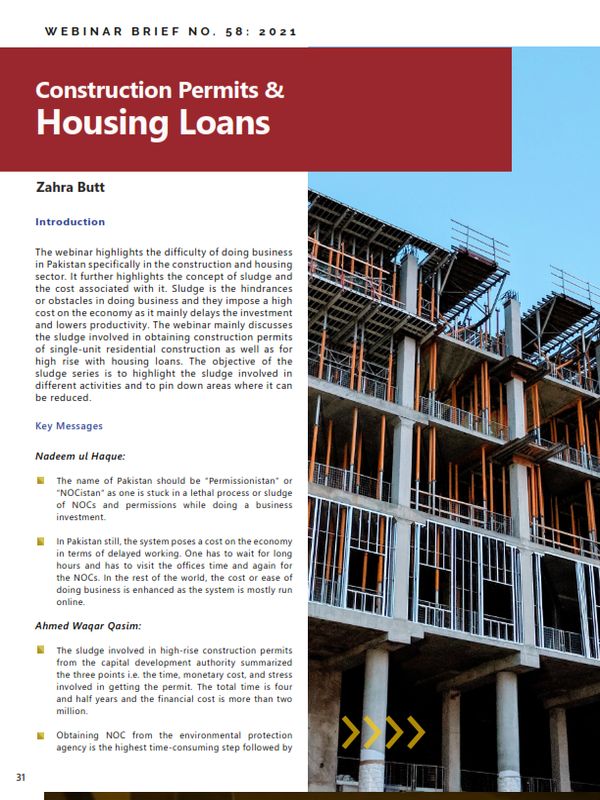Construction Permits and Housing Loans – Webinar Brief 58: 2021
Introduction
The webinar highlights the difficulty of doing business in Pakistan specifically in the construction and housing sector. It further highlights the concept of sludge and the cost associated with it. Sludge is the hindrances or obstacles in doing business and they impose a high cost on the economy as it mainly delays the investment and lowers productivity. The webinar mainly discusses the sludge involved in obtaining construction permits of single-unit residential construction as well as for high rise with housing loans. The objective of the sludge series is to highlight the sludge involved in different activities and to pin down areas where it can be reduced.
Key Messages
Nadeem ul Haque:
■ The name of Pakistan should be “Permissionistan” or
“NOCistan” as one is stuck in a lethal process or sludge of NOCs and permissions while doing a business investment.
■ In Pakistan still, the system poses a cost on the economy in terms of delayed working. One has to wait for long
hours and has to visit the offices time and again for the NOCs. In the rest of the world, the cost or ease of doing business is enhanced as the system is mostly run online.
Ahmed Waqar Qasim:
■ The sludge involved in high-rise construction permits from the capital development authority summarized the three points i.e. the time, monetary cost, and stress involved in getting the permit. The total time is four and half years and the financial cost is more than two million.
■ Obtaining NOC from the environmental protection agency is the highest time-consuming step followed by NOC from the civil aviation authorities. The sludge involved in single-unit residential construction permits from the capital development authority requires a total time of nine months and financial cost is more than one hundred and eighty-five thousand rupees.
■ The steps involved in processing residential construction permits from CDArequire a total time of 15 to 20 working days as per the official claim as there is a stark difference between the official claim and the time people experience.
■ Getting housing finance from banks takes more than four months and costs more than 15,000 rupees.
Faisal Jamal:
■ A lot of time is consumed in getting permission for the camping facilities and approval of all maps and designs from the CDA, civil aviation, and other security agencies.
■ Another restraint is the long duration of the review by Design Vetting Committee arrangement by CDA, usually multiple projects piled up to be reviewed together which delay the overall progress.
■ All projects coming under Prime Minister Amnesty scheme have now a deadline to complete it before July 2023 otherwise they will not be able to benefit from this scheme, such an amnesty scheme where the project completion deadline is in place definitely will be ramped up quickly.
Engr Khizar Hayat Asghar:
■ Most projects were delayed due to changes in regulations and requirements by CDA. Public office staff should be held accountable for wasting contractor and employer time and there should be internal audit mechanisms, checks, and weekly report analysis by the administration of these Public offices to track down performance and targets.
■ Secondly, processes related to utilities and services connections provided to construction sites need to speed up, most projects are not occupied as completion certificate issuance from ministry/CDAis delaying overall project completion status.
Mian Muhammad Faraz Khalid:
■ The time concerned for the gathering of information: all the information is available on the website of the bank for the housing construction for the customer to save time. But as the customers are new they prefer to visit the bank. Customers can download the application form as well. The photograph is not a mandatory requirement as well as the reference’s signature.
■ The approval of the loans is not delayed as customers complain while the main problem that the banks or customers face is the identification of the properties and the documentation related to the properties.
Conclusion: The stakeholders interviewed portrayed a very different situation than what was present in the actual market. The lengthy documentation process involved in the construction of high rise results in limiting the new investors, however, the sector has a lot of potential to grow and provide jobs. The housing finance information is readily available online but due to the lack of familiarity and ease of our people, this process also becomes a lengthy one.




